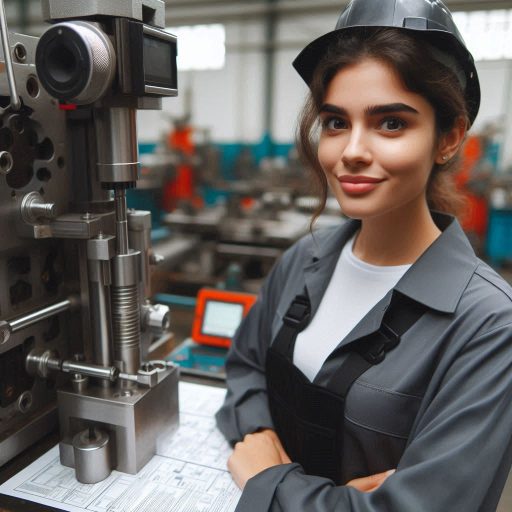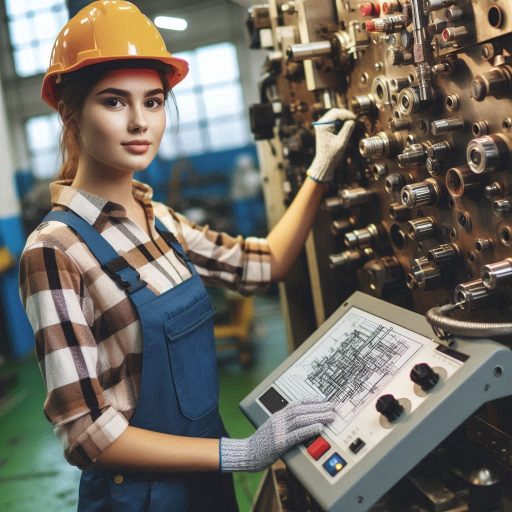Introduction
Role of Industrial Machinery Mechanics in Various Industries
Industrial machinery mechanics are crucial across a wide range of industries, including manufacturing, energy, and transportation.
In manufacturing, they ensure machinery operates efficiently, preventing production delays and maintaining output quality.
In the energy sector, these mechanics keep equipment running smoothly to ensure uninterrupted power generation, which is essential for both industrial and residential needs.
They also play a vital role in industries like mining and agriculture, where machinery reliability is key to productivity and operational success.
Importance of Industrial Machinery Mechanics in Ensuring Smooth and Efficient Operations
The role of industrial machinery mechanics is vital for ensuring smooth and efficient operations.
Their work directly impacts machinery performance, minimizing downtime and avoiding costly disruptions.
Regular maintenance and prompt repairs help extend the lifespan of equipment, reducing the need for expensive replacements.
Efficient machinery operation contributes to higher productivity and reduced operational costs.
By preventing breakdowns and addressing issues proactively, mechanics maintain the reliability and efficiency of equipment.
Their efforts support seamless industrial processes, enhance safety, and ensure that businesses remain competitive.
Overview of the job responsibilities of industrial machinery mechanics
Inspecting, Repairing, and Maintaining Machinery
Industrial machinery mechanics play a vital role in keeping factories and industrial settings running smoothly.
They inspect, repair, and maintain machinery that is crucial to production processes.
Regular inspections help identify wear and tear before they become serious issues.
Mechanics must thoroughly understand each machine’s functions and components to detect problems accurately.
Inspections often involve checking mechanical systems, hydraulic systems, and electrical connections.
Mechanics ensure all parts are properly lubricated, aligned, and functioning as intended.
Any malfunctions discovered during inspections are addressed immediately to avoid costly downtime.
When repairs are needed, mechanics use specialized tools and techniques to fix the issues efficiently.
They may need to disassemble complex machinery to replace faulty components or repair damaged parts.
After repairs, they reassemble the machinery and conduct tests to ensure everything operates correctly.
Maintaining machinery is essential to prolonging its lifespan and keeping production running smoothly.
Troubleshooting Issues and Diagnosing Problems
Industrial machinery mechanics are skilled at troubleshooting issues when machinery malfunctions or shows signs of trouble.
Troubleshooting involves systematically diagnosing the problem to find the root cause.
Mechanics use their knowledge of machinery and experience to identify possible causes of malfunctions.
They may start by reviewing the machine‘s performance history and maintenance records.
Mechanics often use diagnostic tools and equipment to measure performance and identify irregularities.
They check mechanical, electrical, and hydraulic systems for faults or failures.
Identifying the problem accurately is crucial to implementing an effective solution.
Once the issue is diagnosed, mechanics determine the best course of action to resolve it.
This may involve repairing or replacing parts, recalibrating systems, or adjusting settings.
Troubleshooting requires quick thinking and the ability to work under pressure, especially when production is on the line.
The goal is to resolve issues quickly to minimize downtime and maintain operational efficiency.
Performing Regular Maintenance
Regular maintenance is a cornerstone of industrial machinery mechanics’ work, preventing breakdowns and ensuring optimal performance.
Maintenance routines are designed to keep machinery operating efficiently and to prevent unexpected failures.
Mechanics perform routine tasks such as lubricating moving parts, checking fluid levels, and tightening loose components.
Regular maintenance also includes inspecting belts, gears, and bearings for signs of wear.
By addressing minor issues during maintenance, mechanics prevent them from becoming major problems.
Maintenance schedules are often based on the manufacturer’s recommendations or the machine‘s usage.
Mechanics may also use performance data and monitoring systems to identify when maintenance is needed.
Performing regular maintenance helps avoid costly repairs and extends the machinery’s lifespan.
It also ensures that machinery operates at peak efficiency, supporting continuous production.
A well-maintained machine is less likely to break down, reducing the risk of production delays.
Mechanics play a critical role in maintaining the reliability and efficiency of industrial machinery through consistent maintenance practices.
Industrial machinery mechanics are essential to the smooth operation of factories and industrial settings.
They inspect, repair, and maintain machinery, ensuring everything runs efficiently.
Troubleshooting issues and diagnosing problems are critical skills for resolving malfunctions quickly.
Regular maintenance prevents breakdowns and keeps machinery operating at optimal performance.
By combining these tasks, industrial machinery mechanics help maintain production efficiency and prevent costly downtime.
Their expertise and attention to detail are vital in keeping industrial machinery in top condition.
Read: Future of CAD Technician Jobs in Engineering
Different industries that employ industrial machinery mechanics
Manufacturing Industry: Maintaining Production Machinery
Industrial machinery mechanics play a crucial role in the manufacturing industry.
They ensure production machinery operates efficiently and safely.
Regular maintenance of these machines helps prevent breakdowns, which can lead to costly delays in production.
Mechanics routinely inspect, repair, and replace worn parts to keep equipment running smoothly.
They also perform preventive maintenance tasks, such as lubrication and calibration, to extend machinery lifespan.
In the manufacturing sector, the ability to troubleshoot and quickly resolve mechanical issues is vital.
By maintaining production machinery, industrial mechanics help manufacturers meet production targets and maintain product quality.
Construction Industry: Repairing Heavy Equipment
In the construction industry, industrial machinery mechanics are essential for repairing and maintaining heavy equipment.
This includes excavators, bulldozers, cranes, and loaders.
Mechanics ensure these machines are in top working condition, preventing costly breakdowns on job sites.
They diagnose mechanical problems and perform necessary repairs, often working in challenging conditions.
Preventive maintenance, such as checking hydraulic systems and replacing worn parts, is crucial in this industry.
Mechanics must also be skilled in using specialized tools and diagnostic equipment.
Their work ensures that construction projects run smoothly and safely, without delays caused by equipment failures.
Automotive Industry: Servicing Assembly Line Machinery
The automotive industry relies heavily on industrial machinery mechanics to service assembly line machinery.
These mechanics maintain the equipment used to assemble vehicles, ensuring that production lines run efficiently.
They perform routine maintenance tasks like adjusting machinery settings and replacing worn parts to avoid production delays.
Mechanics in this industry must be familiar with robotic systems, as automation is common in automotive manufacturing.
Quick troubleshooting and repairs are crucial to minimizing downtime.
By servicing assembly line machinery, industrial mechanics help automakers maintain high production standards and meet consumer demand.
Aviation Industry: Maintaining Aircraft Manufacturing Machinery
In the aviation industry, industrial machinery mechanics are responsible for maintaining the machinery used in aircraft manufacturing.
This includes equipment for assembling and testing aircraft components.
Mechanics ensure that this machinery operates precisely, as any malfunction can have serious consequences.
Regular maintenance tasks include calibrating machines, inspecting for wear, and replacing parts as needed.
Mechanics also perform diagnostic tests to detect potential issues before they cause problems.
Their work is critical in maintaining the high safety standards required in aircraft manufacturing.
By maintaining aircraft manufacturing machinery, these mechanics contribute to the safety and reliability of the aviation industry.
Overall, Industrial machinery mechanics play a vital role in various industries by maintaining and repairing essential equipment.
In manufacturing, they ensure production machinery operates efficiently, preventing costly delays.
Also, in construction, they keep heavy equipment in top working condition, enabling projects to proceed smoothly.
In the automotive industry, they service assembly line machinery, helping automakers meet production demands.
In aviation, they maintain aircraft manufacturing machinery, ensuring high safety standards.
By performing routine maintenance and making timely repairs, industrial mechanics contribute to the success of these industries, ensuring that machinery operates safely and efficiently.
Their expertise is crucial in preventing breakdowns, minimizing downtime, and maintaining high standards of quality and safety across different sectors.
Read: Quality Control Inspector: Technical Skills Needed
Skills and qualifications required to become an industrial machinery mechanic
Technical Knowledge of Machinery and Equipment
Industrial machinery mechanics must possess a deep understanding of the machinery and equipment they work with.
They need to be familiar with various mechanical systems, including hydraulic, pneumatic, and electrical components.
This technical knowledge allows them to diagnose and repair issues quickly and efficiently.
Mechanics must stay up-to-date with the latest technology and equipment advancements to maintain their expertise.
They should also be able to read and interpret technical manuals, schematics, and diagrams to understand the machinery’s inner workings.
Their ability to comprehend complex systems ensures that they can address any mechanical problems that arise in a timely manner.
Problem-Solving Skills to Diagnose and Fix Issues
Problem-solving skills are crucial for industrial machinery mechanics.
They must be able to identify the root cause of a problem and develop an effective solution.
This often involves troubleshooting equipment, analyzing data, and testing various components to determine what needs to be repaired or replaced.
Mechanics must think critically and creatively to resolve issues that may not have an obvious solution.
They should also be able to work under pressure, as many repairs need to be completed quickly to minimize downtime in a production environment.
Effective problem-solving skills can significantly reduce operational delays and improve overall efficiency.
Physical Strength and Stamina to Handle Heavy Equipment
The job of an industrial machinery mechanic is physically demanding.
Mechanics must have the strength and stamina to handle heavy equipment and perform tasks that require lifting, bending, and standing for long periods.
They often work in challenging environments, such as manufacturing plants, construction sites, and power plants, where they may be exposed to noise, heat, and other harsh conditions.
Physical endurance is essential for completing repairs and maintenance tasks without compromising safety or quality.
Mechanics must also have good hand-eye coordination and dexterity to work with tools and machinery components in tight spaces.
Training or Certification in Industrial Maintenance
Training and certification are vital for industrial machinery mechanics.
Many employers require mechanics to have formal education in industrial maintenance or a related field.
This training provides the foundational knowledge and skills needed to perform the job effectively.
Certification programs, such as those offered by the National Institute for Metalworking Skills (NIMS) or the International Society of Automation (ISA), can enhance a mechanic’s qualifications and job prospects.
These certifications demonstrate a commitment to the profession and ensure that mechanics have met industry standards for competence and safety.
Ongoing training is also important, as it allows mechanics to stay current with new technologies and industry practices.
Industrial machinery mechanics require a combination of technical knowledge, problem-solving abilities, physical strength, and specialized training to excel in their field.
Their skills are essential for maintaining the machinery that keeps industries running smoothly.
By staying up-to-date with the latest advancements and continuously improving their abilities, these mechanics can ensure their success in various industrial settings.
Job outlook and potential for growth in the industrial machinery mechanics field
Increasing Demand for Skilled Mechanics Due to Advancements in Technology
The demand for skilled industrial machinery mechanics is rising due to rapid technological advancements.
As industries adopt new technologies, the complexity of machinery increases, requiring highly trained mechanics.
These advancements create a need for mechanics who can understand and maintain sophisticated equipment.
Employers are seeking mechanics with expertise in modern systems, driving demand for ongoing education and training.
Skilled mechanics who stay updated on the latest technologies are highly valued.
This demand spans across various industries, including manufacturing, automotive, and energy sectors.
As machinery becomes more advanced, the need for specialized knowledge grows, making skilled mechanics indispensable.
Companies are investing in training programs to ensure their workforce can handle the latest machinery.
The increasing reliance on technology in production processes further emphasizes the importance of skilled mechanics.
The demand for mechanics with expertise in cutting-edge technology continues to grow, offering numerous opportunities in the field.
Opportunities for Specialization in Specific Industries or Types of Machinery
Industrial machinery mechanics have the opportunity to specialize in specific industries or types of machinery.
Specialization allows mechanics to become experts in their chosen field, enhancing their career prospects.
Mechanics can focus on industries like aerospace, automotive, or renewable energy, each offering unique challenges and rewards.
Specializing in certain types of machinery, such as robotics, CNC machines, or hydraulic systems, can lead to higher earning potential.
This specialization requires in-depth knowledge and expertise, which can be acquired through targeted training and experience.
Specialized mechanics are often sought after by employers, leading to better job opportunities and career advancement.
Industries with specialized machinery value mechanics who understand the intricacies of their equipment.
The opportunity to specialize also allows mechanics to align their careers with their interests and strengths.
Specialization not only increases job satisfaction but also makes mechanics more competitive in the job market.
The ability to focus on specific areas of machinery or industries offers mechanics a clear path to career growth.
Job Security and Competitive Salaries in the Field
The field of industrial machinery mechanics offers job security and competitive salaries.
As technology continues to evolve, the need for skilled mechanics remains strong.
This demand provides job security for those with the necessary skills and expertise.
Skilled mechanics are less likely to face unemployment due to the constant need for their services.
Competitive salaries are another benefit, with many mechanics earning well above the national average.
The combination of job security and attractive wages makes this field appealing to many.
Employers are willing to pay a premium for experienced and specialized mechanics.
This financial stability is a significant factor in career satisfaction for many in the field.
The growing demand for mechanics also means that new job opportunities are frequently available.
With the right skills and training, mechanics can enjoy a stable and rewarding career.
The benefits of job security and competitive pay contribute to the overall appeal of a career in industrial machinery mechanics.
Industrial machinery mechanics are in high demand due to technological advancements, offering opportunities for specialization and job security.
Skilled mechanics are crucial in maintaining complex machinery, making them invaluable across various industries.
Specialization allows mechanics to enhance their career prospects and align their work with their interests.
The field offers competitive salaries and job security, making it an attractive career choice.
As technology continues to evolve, the demand for skilled mechanics will only increase, ensuring a bright future for those in the profession.
Transform Your Career Today
Unlock a personalized career strategy that drives real results. Get tailored advice and a roadmap designed just for you.
Start NowRead: CAD Technician Job Market: Trends and Insights

Learn More: Why Choose a Career in Wind Turbine Technology?
Challenges faced by industrial machinery mechanics
Working in Potentially Hazardous Environments
Industrial machinery mechanics often work in environments with potential hazards, including high temperatures, loud noises, and moving parts.
Safety is a top priority, requiring adherence to strict protocols and wearing personal protective equipment (PPE).
Exposure to these hazards necessitates comprehensive safety training and a proactive approach to risk management.
Mechanics must remain vigilant and follow safety procedures to prevent accidents and injuries.
Regular safety drills and equipment checks help mitigate risks and ensure a safe working environment.
Dealing with Complex and High-Tech Machinery
Mechanics frequently encounter complex and high-tech machinery, demanding specialized knowledge and skills.
Modern equipment often integrates advanced technologies, such as computer controls and automation systems.
Mechanics must be adept at understanding these sophisticated systems to perform maintenance and repairs accurately.
Training and continuous education are essential for staying updated on technological advancements and industry trends.
Diagnosing and troubleshooting issues in high-tech machinery requires a deep understanding of both mechanical and electronic components.
Pressure to Quickly Diagnose and Repair Machinery to Minimize Downtime
Mechanics face significant pressure to quickly diagnose and repair machinery to minimize downtime.
Unplanned equipment failures can halt production and lead to substantial financial losses.
Therefore, mechanics must swiftly identify the root causes of problems and implement effective solutions.
This requires a combination of experience, intuition, and technical expertise.
Effective problem-solving skills and the ability to work efficiently under pressure are crucial.
Implementing preventive maintenance strategies can reduce the frequency of breakdowns and improve overall machinery reliability.
Balancing Efficiency and Accuracy
In addition to speed, mechanics must balance efficiency with accuracy.
Rushed repairs can lead to additional issues and further downtime.
Mechanics need to ensure that repairs are thorough and that machinery operates correctly before resuming full production.
This balance requires careful attention to detail and a methodical approach to each task.
Proper documentation of maintenance and repairs helps track machinery performance and identify recurring issues.
Adapting to Industry-Specific Challenges
Different industries present unique challenges for industrial machinery mechanics.
For example, in manufacturing, mechanics may deal with high-speed production lines, while in energy sectors, they may face large-scale equipment and extreme conditions.
Each industry demands specific expertise and solutions tailored to its operational needs.
Mechanics must adapt to these varying demands and continuously refine their skills to meet industry standards.
Most importantly, working as an industrial machinery mechanic involves navigating hazardous environments, handling complex machinery, and working under pressure.
Success in this role requires a strong focus on safety, advanced technical skills, and the ability to perform efficiently and accurately.
By embracing these challenges and continuously improving their expertise, mechanics can excel in various industries and contribute significantly to operational success.
Read: Radiologic Technologist: Work Environment Insights
Importance of ongoing training and professional development for industrial machinery
Keeping Up-to-Date with New Technologies and Equipment
Industrial machinery mechanics must stay current with emerging technologies and equipment.
Technology evolves rapidly, and staying informed is crucial.
Regularly updating your knowledge helps you adapt to new machinery and tools.
This knowledge ensures you can maintain and repair the latest models efficiently.
Understanding advancements in machinery technology also improves your problem-solving skills.
Staying current enables you to diagnose and fix issues more effectively.
It also helps you remain competitive in the job market.
Industry publications, online resources, and professional networks are valuable for staying updated.
Engaging with these resources ensures you are aware of the latest trends and innovations in machinery.
Attending Specialized Training Programs to Expand Skills
Specialized training programs offer significant benefits for industrial machinery mechanics.
These programs provide hands-on experience with new equipment and technologies.
They also cover advanced maintenance techniques and troubleshooting methods.
Attending these programs helps you develop specialized skills that are highly valued.
They often include certifications that enhance your qualifications and job prospects.
Training programs also offer networking opportunities with industry professionals.
Networking can lead to valuable connections and job opportunities.
Investing time in specialized training programs is an effective way to advance your career.
It demonstrates your commitment to continuous improvement and professional development.
Pursuing Certifications to Enhance Job Opportunities and Advancement
Certifications are essential for career growth and job opportunities in industrial machinery maintenance.
They validate your skills and knowledge in specific areas.
Earning certifications from recognized organizations can open doors to new job roles.
Certifications often lead to higher salaries and better job security.
They show employers that you have the expertise needed for complex machinery.
Pursuing certifications also keeps you motivated and focused on professional development.
It demonstrates your dedication to maintaining high standards in your field.
Certifications are valuable for advancing to supervisory or management positions.
They also help you stay competitive as new technologies emerge.
Integrating Continuous Learning into Your Career
Incorporating continuous learning into your career strategy is crucial.
Regularly updating your skills through training and certifications keeps you relevant in the industry.
It also helps you adapt to changes in technology and equipment.
Embrace opportunities for learning both inside and outside the workplace.
Seek out workshops, webinars, and industry conferences.
Participating in these events enhances your knowledge and skills.
It also shows your commitment to professional growth.
Continuous learning helps you tackle new challenges effectively and advance in your career.
On a final note, staying up-to-date with technology, attending specialized training, and pursuing certifications are key to success in industrial machinery maintenance.
These practices ensure you remain competitive and capable in a rapidly evolving field.
They also provide opportunities for career advancement and professional development.
Embrace these strategies to enhance your skills, expand your job opportunities, and advance your career.
Learn More: Educational Requirements for Environmental Technicians
Conclusion
Industrial machinery mechanics are vital in various industries, ensuring that equipment operates efficiently and reliably.
They are responsible for maintaining, repairing, and troubleshooting machinery crucial to production processes.
Their role is essential in industries such as manufacturing, energy, and transportation, where machinery plays a central role in operations.
To excel in this field, mechanics need a blend of skills and qualifications.
Proficiency in mechanical systems, electronics, and problem-solving is crucial.
Mechanics must also be well-versed in hydraulic and pneumatic systems, which are common in industrial machinery.
Technical training and hands-on experience are typically required, providing a solid foundation for managing complex machinery.
Aspiring mechanics should consider pursuing this career due to its rewarding nature and dynamic opportunities.
The field offers job security and competitive salaries, driven by a consistent demand for skilled professionals.
With ongoing advancements in technology, mechanics work with cutting-edge equipment, making their roles both challenging and exciting.
A career in industrial machinery mechanics not only promises a stable profession but also offers continuous learning and growth opportunities.
Embrace this career path to benefit from a fulfilling and evolving profession that plays a critical role in modern industries.
[E-Books for Sale]
The Big Book of 500 High-Paying Jobs in America: Unlock Your Earning Potential
$19.99 • 500 High-Paying Jobs • 330 pages
Explore 500 high-paying jobs in America and learn how to boost your career, earn more, and achieve success!
See All 500 High-Paying Jobs of this E-Book
1001 Professions Without a Degree: High-Paying American Jobs You Can Start Now
$19.99 • 1001 Professions Without a Degree • 174 pages
Discover 1001 high-paying jobs without a degree! Unlock career tips, skills, and success strategies for just $19.99!




